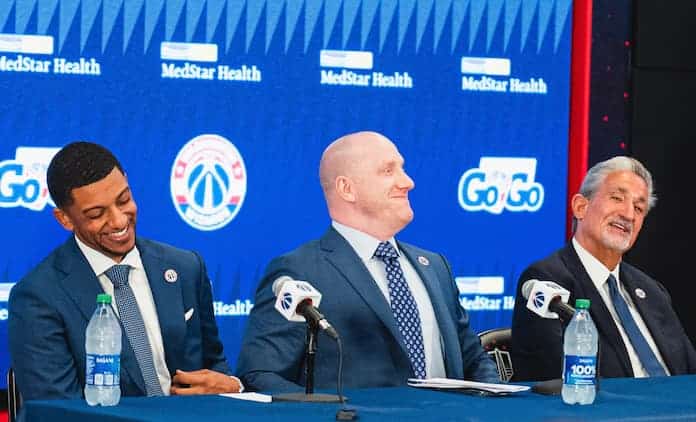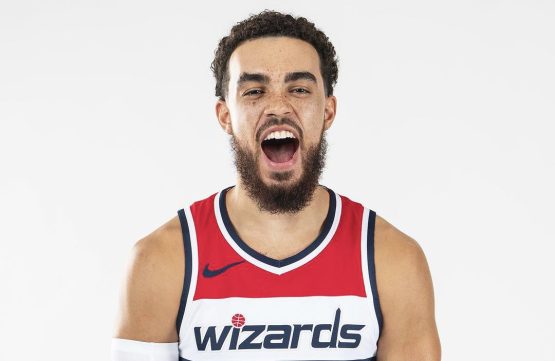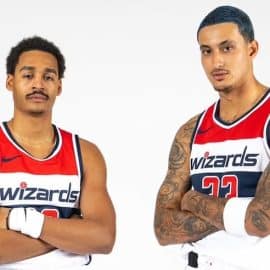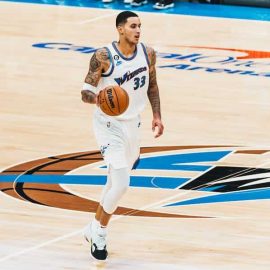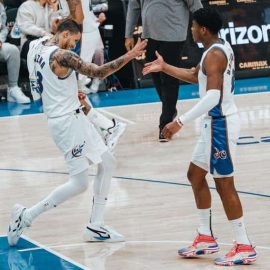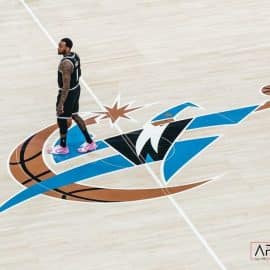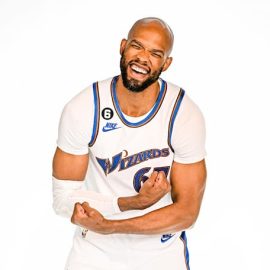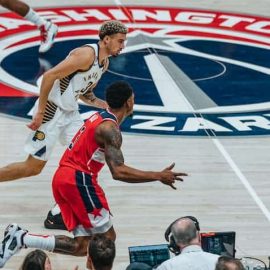For a laundry list of reasons, the Washington Wizards have not been an Eastern Conference contender since 2017’s infamous Game 7 letdown in Boston. In the past six seasons, the Wizards have lived in NBA purgatory (resulting in late lottery picks) with a 204-268 (.432) regular season record and a mere three playoff wins. In a surprise move at the time over a week after the Wizards’ 2022-23 season ended, team owner Ted Leonsis released Tommy Sheppard on April 19 citing back-to-back years missing the playoffs and a lack of vision. A month later, Leonsis personally (after previously using a consulting firm in 2019 post-Ernie Grunfeld) set his sights on Michael Winger from the Los Angeles Clippers to become the president of Monumental Basketball (including the Mystics).
Well respected in league circles, Winger orchestrated a coup that even he did not forecast by bringing along his former co-worker Will Dawkins from the Oklahoma City Thunder to serve as general manager as well as former Atlanta Hawks president of basketball operations Travis Schlenk as Washington’s senior VP of player personnel to form a formidable triumvirate of decision makers. Winger was officially hired on May 25, while Dawkins and Schlenk did not officially join until the first week of June. Shortly thereafter out of necessity before the June 22 NBA Draft, the new front office quickly concluded the Wizards could not be a sustainable contender built around Bradley Beal, which the shooting guard concurred with in dinner with the new brass.
“Can we assemble a legitimate and sustainable contender around the nucleus that we had?,” Winger reflected on his thought process. “Through really hard analysis, really difficult conversations, the conclusion was no and I think the players concluded the same.”
Despite Beal’s no-trade clause leverage, the Wizards made out decently from the supermax contract once flipping Chris Paul to Golden State for 24-year-old Jordan Poole who desperately needed a change in scenery. Re-signing Kyle Kuzma to a $90 million bag and sign-and-trading Kristaps Porzingis’s player option for Tyus Jones were other summer headlines, but the drafting of 19-year-old Bilal Coulibaly 7th overall was the Wizards’ biggest upside move in a busy offseason. Washington’s over/under win total for the season is 24.5 (less than 30 percent) according to Vegas, which Kuzma is not a fan of, but the reality is the Wizards are finally embarking on a long overdue rebuild whether they want to describe it as a reshape, reset, or refresh. That does not mean Washington will partake in any tanking as they want their cultural foundation to be rooted in competition fueled by the duo of Kuzma and Poole both on and maybe more importantly off the court.
“I avoided saying [rebuild] because it sort of does have this non-competitive ring to it and I think it has become that way over the course of time,” Winger explained when asked why ‘rebuild’ has become a taboo term for front offices. “Rebuild and being uncompetitive are not synonyms. At the risk of people drawing the conclusion that they are synonymous, I avoided using it. I’m not averse to using it.”
“How are you getting to that era of contention down the line? You certainly can’t do it by being mediocre, mediocre, mediocre. We’re not trying to be mediocre, we’re trying to instill competitiveness, intelligent basketball, and raise young players, while at the same time winning basketball games. What we don’t believe in is a player development mindset where you can breed a lot of good habits through intentional losing, we fundamentally don’t believe in that. So part of building good habits is putting our players in positions where they have an opportunity to experience those moments where habits can develop. That happens through competition, that happens through the opportunity to win games, win quarters, win possessions. That’s why we want a competitive team,” Winger elaborated when asked about the possibility of remaining in NBA purgatory by remaining competitive.
On Tuesday in a press conference a week before the start of the 2023 training camp on October 3, Winger and Dawkins addressed the media for over an hour painting a picture of the vision they have for the upcoming multi-year rebuild focused on research and player development. Here are the most noteworthy quotes to get a sense of the organization’s new vision described by Dawkins as initially ‘process over outcome’ and ‘evidence-based not results based’.
“We have a vision for the team, it is ambitious and it is a very heavy lift. We want to build an organization that develops and can support a sustainably great team. We don’t want to be a flash in the pan, we don’t want to be a one-hit-wonder,” Winger said as part of a detailed multi-part opening statement lasting 9 minutes. “A lot of patience, an intense focus on player development, intense focus on research. … We will usher in at some point in the future an era of sustainable contention and we’re going to work our butts off every single day to get us to that point.”
“It’s the holistic approach, making sure that people are taken care of everything you need to before you can get on the court,” Dawkins elaborated on Washington’s approach to player development going forward. “Family, nutrition, performance, mentally. Everything when it comes to player development we’re going to level up and make it the best in sport.“
Winger on how to keep the team fighting competitively through development growing pains like losing streaks:
“We’re going to be in front of our players a lot, probably more than usual. Indicating where progress is being made, letting those guys lean into that progress. Those marginal gains will compound and it’s up to us to share where these marginal gains are occurring. There will be gains in every single one of the losses. It will be on the coaching staff, all of us who do have that player development mindset to extract from those losses the marginal gains and illustrate those. If we do that repeatedly over time, our players will come to appreciate we’re very serious about the idea of marginal improvements, we’re very serious about player development. We’re holding everyone accountable for everything. We’re not going to let slippage go unspoken. We’re not going to let something other than 100 percent effort go ignored.“
“We know it’s going to take time. To help alleviate the slog it could feel at times, we have to continue to highlight the successes we’ve had. They’re going to come in the form of players elevating their game, really special regular season wins. We are going to win some regular season games that people don’t expect us to win and we’re going to highlight those. We’re going to make some spectacular plays on the defensive end that probably aren’t going to make it on the highlight reel, but we’re going to broadcast those.”
Winger on bringing back joy and Dawkins on improving communication, things the duo received as feedback from returning players:
“The theme was joy. Every single guy said we love playing basketball and we just want to have more fun doing it. And so we said, ‘easy, done, we’ll take care of the rest.’ The one that resonated with me the most was we want to have more fun.”
“Making sure communication is solid, consistent. The left hand knows what the right hand is doing and that’s something we realized right away and addressed.”
Dawkins on the environment the Wizards are striving for:
“[Creating an environment] starts with joy, starts with giving the guys the resources, starts with being player centric and player first. Being more collaborative, making sure the guys have a say in what they do, how they do it. Making sure we treat everyone with an elite level of professionalism and give people the resources to do their job. If it’s an environment that breeds competition, breeds pursuing progress, we’re going to look to our left and to our right and see someone doing something to a high level, that will force you to want to do it to a high level. We’re going to raise the bar and make sure everyone feels supported and opinionated. They can step up and say what they need to say and know that it’s going to stick within the walls and be protected. When you come to work and have a place where you feel protected, but also have the resources to do the job, that’s when you get your best results.”
Winger and Dawkins spoke highly of inherited head coach Wes Unseld Jr.:
“I was delighted to join in large parts because of Wes. We spoke with Wes a couple years ago when we had a vacancy with the Clippers and we all walked away very impressed with Wes. His basketball intelligence is off the charts. His unflappability is calming for a room. He’s a stable guy, ultra high character guy, basketball junkie. … He’s going to coach his butt off, we know that. He’s registered with us countless times how excited he is about this team. It’s going to be hard for him to blend those young players with the vets. We’re going to have streaks, we’re going to have ebbs and flows throughout the season, and there’s no evaluation on that kind of thing. If our young players are getting better, if our vets are contributing, the culture is in a good place, I think Wes is doing exactly the kind of job Wes wants to do.”
“The biggest thing I’ve learned about Wes is the type of person he is. He doesn’t have an ego, he’s supremely humble, he carries himself like the video guy when he first started even as a head coach in terms of his work ethic and his approach and his diligence. He’s a grinder, he’s about the right things. … We probably talk or text every single day. We probably haven’t missed a day so we’re learning each others cadences. … You sleep good at night knowing that Wes is in charge of holding up the values and characteristics that we find are important because we got together as a group and made sure we all thought they were important.”
Add The Sports Daily to your Google News Feed!
